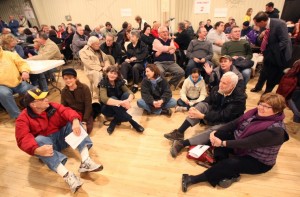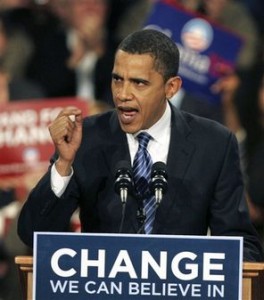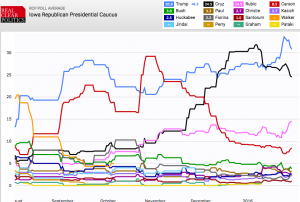This week I gave an interview to a local television station (8TV) who wanted an american to help them explain to their viewers the U.S.’s rather peculiar way of electing a new president. The basic question they were asking is why does the whole thing start in Iowa and why is it so important.
Iowa
 The state of Iowa is relatively small both in population and overall territory. Iowa has a population of jsut over 3 million people or less than 1% of the 318 million people who live in the United States. In terms of size, the stae is 176,000 square kilometers (56,000 square miles) or about 1.4 % of the country and is made up of corn fields and some high tech manufacturing. Its captial city, Des Moines has a population of 250,000 people or just a fraction of a city such as Barcelona or neighbouring Chicago.
The state of Iowa is relatively small both in population and overall territory. Iowa has a population of jsut over 3 million people or less than 1% of the 318 million people who live in the United States. In terms of size, the stae is 176,000 square kilometers (56,000 square miles) or about 1.4 % of the country and is made up of corn fields and some high tech manufacturing. Its captial city, Des Moines has a population of 250,000 people or just a fraction of a city such as Barcelona or neighbouring Chicago.
Iowa’s population is 91% white, 4% latin and only 2% african american and is not really very representative of the country as a whole. A good question is then why does the promary season start there?
American Politics
To make any sense of the U.S. political system, a few things need to be understood. The first is that the primary process currently underway is run by the two major political parties which are independent from the government and thus are free to choose their political candidates more or less as they see fit, subject to whatever local laws may apply.
What is going on in Iowa and later in New Hampshire and then the other 48 states is the process by which these political parties will choose delegates to their national conventions. The conventions are the bodies that will choose the candidates to represent the parties in the national election.
Thus when we read that one candidate has “won” the Iowa Caucus or the New Hampshire Primary, what really happened is that delegates who are sympathetic to them have been chosen to represent their district.
In Iowa, the system is even more complex as the Caucus process actually nominate delegates from Iowa’s 1,681 precincts who then will go to a series of meetings at the first the county and then the state level to finally determine who will represent Iowa at the national convention. Iowa will send 30 delegates to the Republican convention and 44 to the democrat’s event.

The second point is that the United States is still a group of States that came together a couple of hundred years ago and still maintain a degree of independence. Because of this the State of Iowa decides how to run its political process and has, for many years, relied on the system of caucuses or small meetings held at the local level. Other states, such as New Hampshire have chosen to allow the parties to use the States’ voting system to hold a the first primary in the nomination season. New Hampshire has actually passed a state law to protect its first primary status and its officials have said publicly that they will move the date up if another State tries to pre-empt them!
A process that seems to work
Even though the current process was never actually designed, it does seem to work in that candidates are obliged to go to different parts of the country and appeal to different voters. The sequence is roughly that they start in Iowa, move on to New Hampshire, go to Nevada and South Carolina and then have 13 simultaneous contests on what is normally called super Tuesday on March 1st. The full calendar can be found here courtesy of the New York Times.
When the races are close, the strategy followed by the different candidates becomes critical as they must decide where to spend their time, energy, and advertising money.
 The reason that Iowa and later New Hampshire are important is that they can help sort out which candidates have significant appeal with people when they actually come out for a caucus or a primary. A caucus, which again is a meeting of people in a given neighborhood or community is a long, drawn out affair and requires real commitment. In Iowa, for example, about 20% of registered Republicans or Democrats normally turn up to participate. In 2008, that number doubled for the Democrats as thousands of young people turned up to vote for Barak Obama. His win in Iowa was largely responsible for much of the country to start to take his chances of wining the nomination seriously and Senator Sanders is hoping to repeat Obama’s triumph.
The reason that Iowa and later New Hampshire are important is that they can help sort out which candidates have significant appeal with people when they actually come out for a caucus or a primary. A caucus, which again is a meeting of people in a given neighborhood or community is a long, drawn out affair and requires real commitment. In Iowa, for example, about 20% of registered Republicans or Democrats normally turn up to participate. In 2008, that number doubled for the Democrats as thousands of young people turned up to vote for Barak Obama. His win in Iowa was largely responsible for much of the country to start to take his chances of wining the nomination seriously and Senator Sanders is hoping to repeat Obama’s triumph.

On the Republican side, the large field of candidates will most likely be narrowed after Iowa and New Hampshire as it is difficult to imagine some of the candidates far back in the polls to recover if they get no notice in the first two contests. The big question in Iowa is whether the people who say they support Donald Trump and Ted Cruz will actually turn out and participate in the Caucuses.


Great post! Actually, I did not know the reason why Iowa and later New Hampshire are that important till I read your good explanation here. Thank you for sharing your insights.
Omer,
Thanks for your comment.
I wrote the post because many people had asked me the same question. The immediate result is that O’Malley dropped out of the Democratic contest and Huckabee from the Republican one. Also the fact that Donald Trump lost the first contest and Senator Sanders did so well will change the way things play out in New Hampshire on Tuesday next week.
Another loss for Trump and a win for Sanders will set things up for a very interesting race on both sides!
Mike R